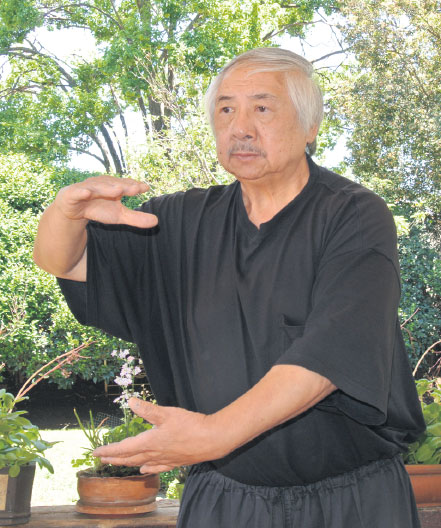Martial arts master has fought for respect

Through the oppressive days of apartheid to the present day, South African teacher has lived by the philosophy of his Chinese forebears
When Edward Jardine was young he used to attend family functions where relatives would exchange martial arts stories and sometimes demonstrate their skills. As a child this fascinated him and he learned to imitate them. Today he is a martial arts teacher.
Jardine is a third-generation Chinese South African. His grandfather came originally from Guangzhou province. His father was a boxer and uncles from China were involved in wushu (martial arts).
| Edward Jardine, is head of the International Tai Chi Society, which has branches all over the world. Provided to China Daily |

Jardine says he has been training in karate for several decades and owns a training school. He is a seventh-degree black belt in the Ryukyu Kobujutsu Hozon Shinko Kai martial arts system. He established the interracial training school in the early 1960s when it was illegal in South Africa for people of different races to mix.
"I am proud of my Chinese heritage, the philosophy, culture, the attitude now of creating a win-win situation for all," he says. "As a third-generation Chinese, I feel that I can only be a better South African if I understand how to be a good Chinese. There was a risk of being arrested for teaching mixed races in my early days. But doing the correct thing is more important than the fear of arrest."
Jardine says his brother, Ivan, who is now an ear, nose and throat surgeon, was banned from fighting in the finals of a junior national karate competition in South Africa in the early 1970s because he is nonwhite. It was a great disappointment for the family, says Jardine. From that disappointment he learned that to compete with others is not as important as competing with oneself. This led him to the study of wushu.
The Chinese were despised in South Africa during the apartheid era, Jardine says. Apartheid laws made them feel inferior but united them as a Chinese community in the country. As a young child, Jardine's parents imbued in him a culture of hard work. His parents taught him that they had to overcome being looked down upon by self-improvement.
Jardine is the head of the International Tai Chi Society, which has branches all over the world. He has taught in Botswana, Finland, Sweden, the United States, Greece, Mauritius, Japan and Taiwan. Some of his former students are teaching in the US, Australia, Canada, Greece, Mauritius and the United Kingdom. He teaches tai chi and traditional Japanese martial arts, including karate and weapons training.
"This is not a sport but a way of life," he says. "It a self-development program that mentally and spiritually improves your mind, body and spirit through training. Tai chi helps us in self-defense and understanding different cultures and discipline. It is a physical exercise with a mental philosophy. "
He says martial arts help people maintain focus and concentration and deal with relationships and work interactions. Training in martial arts also helps children gain confidence. Practicing the movements enhances brain capacity, physical coordination and fitness. Children who are confident, physically fit and understand self-defense are better able to deal with bullies in their schools and communities.
Jardine says he trains at orphanages for free and also takes part in corporate seminars, as well as teaching at his school.
"I have been fortunate to teach tai chi in many countries," he says. "The martial art traditionally is not meant to be a sport. It is a disciplined way of life. Self-defense is not only against others. The most important self-defense is to improve oneself."
Martial arts run in the family. His wife, Phyllis, also trains in tai chi. Their daughter learned martial arts but is now an accountant. One of his sons, Lee Jardine, teaches martial arts at the University of Witwatersrand.
Jardine religiously follows martial arts. "Martial arts in China is much more than fighting," he says. "It is a study of physical culture and mental development. There is no winning or losing, but life and death. I believe that the art of war leads to the path of peace."
His wife, who has a second-degree black belt in Ryukyu Kobujutsu and has been training in tai chi for 28 years, teaching for the past 10, is full of praise for her husband. "He is a very encouraging teacher and husband and has brought the best out in me," she says. "That has made me feel good about myself. A loving, humorous and gentle person who has the intellectual and emotional ability to bring martial arts and life's situations down to a commonsense basis. Many a difficult situation has been resolved through his way. He is a mentor to many people."
She says training has molded Jardine to be the man he is. Correct training enhances the health of mind and body and teaches you to meet life's confrontations in a positive manner, she adds.
For China Daily
(China Daily Africa Weekly 12/01/2017 page21)
Today's Top News
- Xi urges central SOEs to contribute more to Chinese modernization
- Five continents, five rhythms in 2025
- Lawmakers review draft law to expand childcare services
- China's new-style tea brands find a hot new market in US
- Xi extends congratulations to Chilean president-elect
- Japan urged to stop provocative moves































